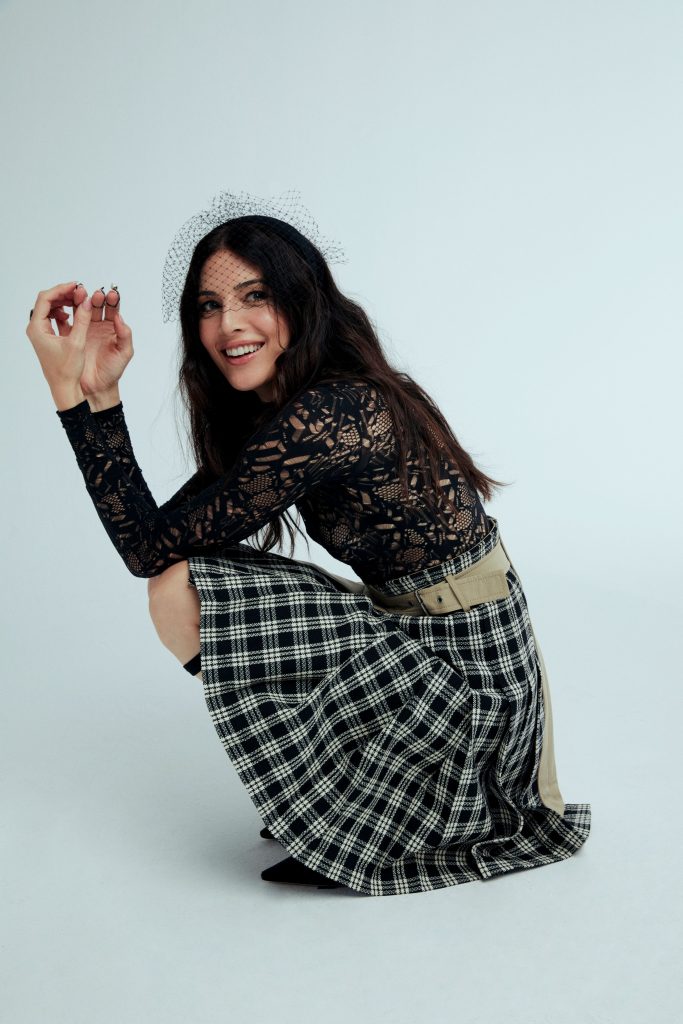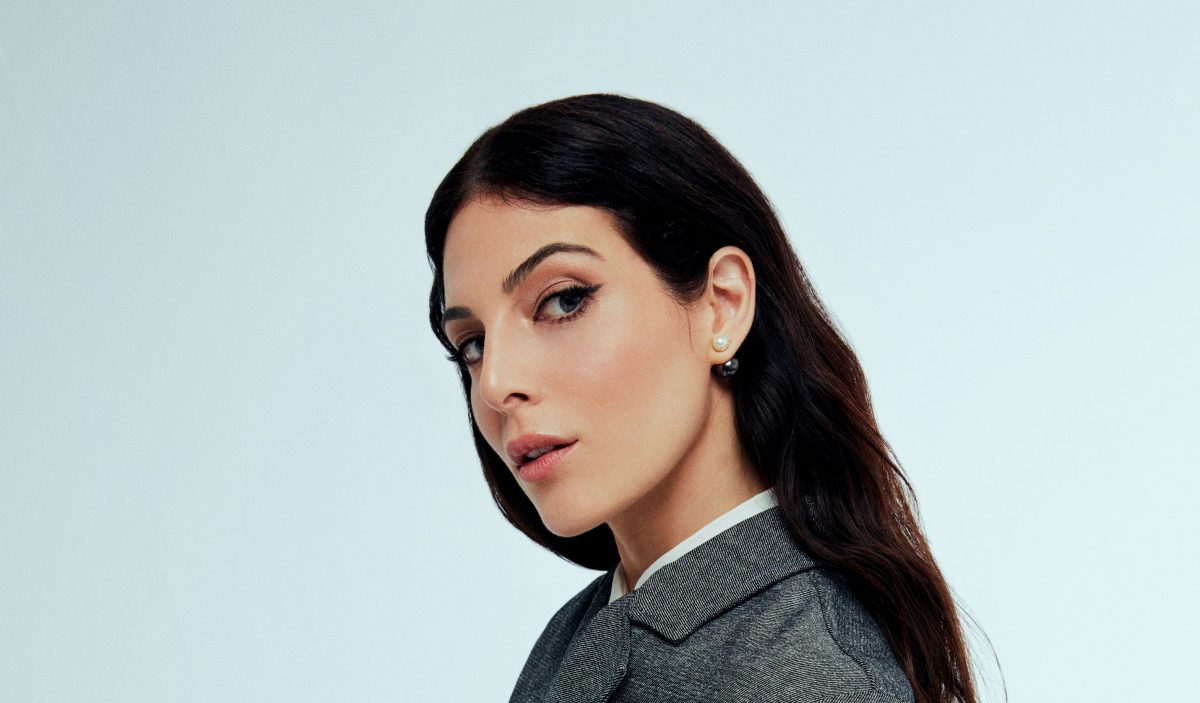Lebanese actress Razane Jammal, the new face of Dior in the Middle East, fresh off the global phenomenon series The Sandman and the box-office record breaker Kira & El Gin, is flourishing. On the inside, she’s still working to overcome the hardest loss of her life
Razane Jammal dreamed of this all, once. She was six years old in Beirut, Lebanon, and as her parents’ marriage fell apart in the next room, she turned up the television’s volume, flipped the channel to find an old movie, and envisioned herself on that screen—an actress, an artist, a true star. Maybe she could go on the stage, she thought. Maybe even Hollywood.
‘Everyone’s going to love me’, that six-year-old repeated to herself, pushing the trauma unfolding in her home, and the traumas that her city was enduring year after year around her, out of her mind. ‘Everyone’s going to love me.’

Jammal dreamed of being on a set like The Sandman, and in early 2021, her dream came true. After more than a decade of rising the ranks in both Hollywood and the Arab cinema scene, this was perhaps her biggest break yet, the chance to star in major Netflix blockbuster, based on one of the most beloved properties in DC Comics’ treasure chest.
She didn’t expect the pain that was to come, just as she was about to perform her character Lyta Hall’s most emotional scene, a moment in which she would say goodbye to her husband as he passed on into the next life. She didn’t expect to get the call that her mother had just slipped into a coma.
“I was playing a character that was going through grief, and I was in parallel losing my own mom. Nobody knew except for my co-star Vanesu [Samunyai] and maybe two makeup artists. I didn’t want to make a big scene about it,” says Jammal.
“I was filming a scene of losing someone without knowing if I had lost her already.”
As the show releases on Netflix, Jammal, 34, is not the person she was before she signed on for the project. She’s spent the last year since she lost her beloved mother working tirelessly, pulling 14-hour days six days a week, signing on for project after project and pushing herself harder than she has in her life.

“I haven’t stopped working since, honestly. I haven’t wanted to have any time off,” Jammal says.
It’s been an all-out sprint, but as Jammal starts to look at how far she’s run, and where it’s led her, she’s now realising that she’s ended up exactly where she’d always hoped she’d be. And a part of her thinks it’s because her mother has been running alongside her all the way.
“I’m a very spiritual person. I feel like she is here helping me, guiding me, because a lot of things are aligning in a way that has never happened before, It almost feels supernatural. I feel like at times that have been hardest, my mom has been there to the universe saying ‘back off my daughter. I have her back,’” Jammal continues.
While The Sandman may be Jammal’s biggest Hollywood project to date, she has followed it up with hit after hit. This year has also seen the release of Kira & El Gin, the latest blockbuster from Marwan Hamed that has already climbed to top place on the all-time Egyptian box office list only weeks into its run, putting Jammal on a clear path to the Arab A-list—cemented now as the actor was just named the face of Dior in the Middle East.
“I started dreaming of Hollywood and wanting to go abroad, because the trauma of war caused people to tell me to leave and escape the pain of the region. I’m so happy that I was pulled back to the Middle East, because these are my roots—I wasn’t in touch with them the same way back then. I had to lose myself in order to find myself again,” says Jammal.
“Now I can not only work on beautiful projects with talented people here in the region, but also work internationally to help contribute positively to the way Arabs are perceived across the world. I will always do that to the best of my ability,” she continues.
Jammal is currently in Turkey, filming another high-profile project she can’t speak publicly about yet, buzzing still at how it aligns with not only the artists’ life she envisioned, but the person she’s become—the person her mother helped her become.
“My career has shifted tremendously since. I took three different projects that are very, very interesting and very aligned with who I am as a person and the roles that I want to play. Right now I’m also playing for someone who’s grieving, someone that also heals from her grief. It helped my career in a way, and I’m getting some help through doing it,” says Jammal.

“As a person, going through grief allows you to understand emotions that you didn’t necessarily understand before. There’s a lot of things that I’ve just started understanding about life. When you’re growing up, you think you know everything, you reject the lessons people try to teach you, but actually, you don’t know anything. Now, I can be humble to say that I didn’t know much, I didn’t know everything. Now I’m just glad to continue living like a human being and having experiences and growing and evolving as a person. And putting all that into my work,” she continues.
Growing up, Jammal, in her own words, was always a bit ‘extra’, with her mom being the subtle one. She had to fine tune herself to vibrate at her mother’s frequency, a frequency that was sweet and raw and vulnerable and nurturing. She taught her empathy, she taught her to harness her own sensitivity, a sensitivity she’s always in a battle to both protect and reveal through her craft.
“My mother learned to wall off her sensitivities. For me, I need to be sensitive. I need challenges to soften me up rather than make me tougher. I can be strong, but I don’t want to close myself off, because when I do that, I’m not able to feel anymore,” says Jammal.
“My mother taught me things not by saying anything, but just by being. You realise the lessons you learned when they’re gone. You realise the little things they did. You don’t know when you’re living it. It’s only after she’s gone that I can see the immense lessons than I have to credit to her.”
In many ways, her mother’s lessons are the lessons of being Lebanese, a people who have endured hardship after hardship—“the garbage crisis, the conflicts, the loss of our money, and the explosion”—and yet have refused to let their strength belie their tenderness, their love of life and culture, to lose their passion for the things that make life worth living.

“Lebanon made me enjoy the little things in life, made me enjoy smiling at my neighbor. It opened me up to the people in the street, it made me strong—because there’s no other way to survive it—but it made me a deep person as well. You realise that the mix of everything—the mix of cultures, the mix of experiences—you realise it’s a superpower,” Jammal says.
As Jammal has fulfilled the dreams of the six-year-old who first manifested this, but the goals have changed. No longer is Jammal concerned about being loved, no longer is acting a fairy tale. It’s grueling—emotionally, physically, spiritually—but it’s toil she can’t live without. It’s what gets her up in the morning, sore from the day before, and ready for the next. This is what she lives for—and she lives it knowing her mother is not only proud of her, but right there with her in every moment.
“I’m going to live my life to the fullest, because I owe that to her — to carry her lessons with me and spread whatever she taught me,” Jammal says.
“I guess that’s my way of keeping her alive.”
